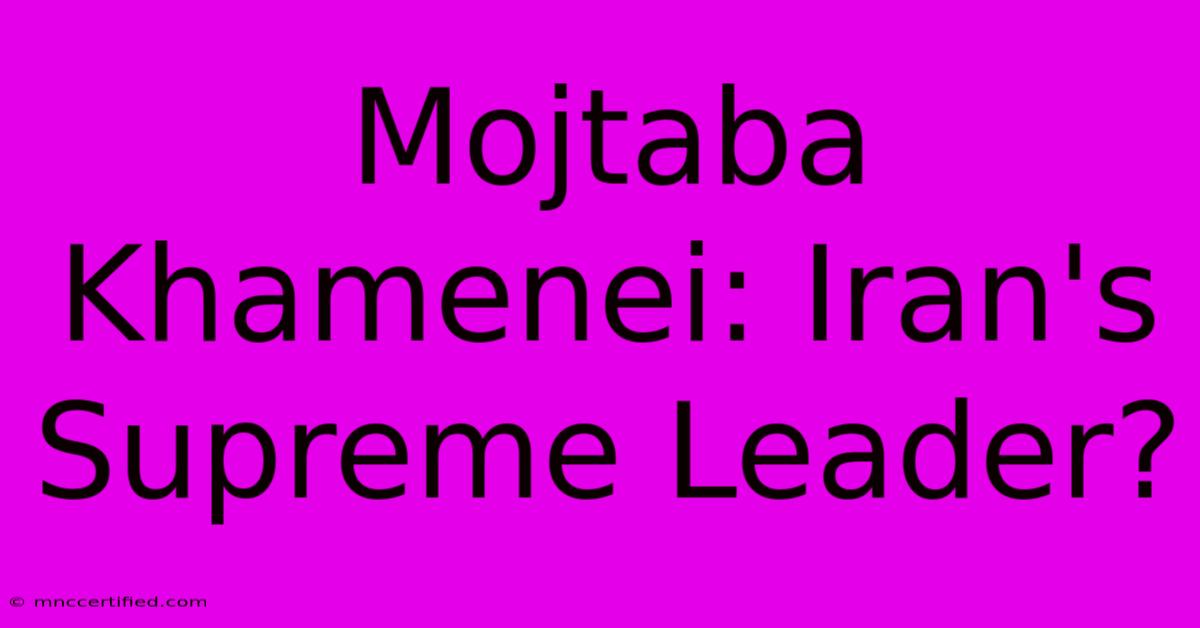Mojtaba Khamenei: Iran's Supreme Leader?

Table of Contents
Mojtaba Khamenei: Iran's Next Supreme Leader? A Look at the Contenders and the Succession Question
The question of who will succeed Ayatollah Ali Khamenei as Supreme Leader of Iran is a topic of intense speculation and significant geopolitical importance. While no clear successor has been named, Mojtaba Khamenei, the Supreme Leader's son, frequently emerges as a leading contender. This article will delve into the potential candidacy of Mojtaba Khamenei, examining the factors supporting and challenging his ascension, and analyzing the broader context of the Iranian succession process.
Understanding the Iranian Succession Process
The process of selecting a Supreme Leader in Iran is shrouded in secrecy and lacks a clearly defined procedure. The Assembly of Experts, a body of 88 clerics elected by the Iranian people, is responsible for choosing the next Supreme Leader. This body holds significant power, but its decisions are often influenced by powerful factions within the Iranian political system, making the selection process complex and far from transparent. The chosen successor must meet stringent religious and political criteria, including possessing exceptional religious scholarship and enjoying the support of key power brokers.
Mojtaba Khamenei: A Profile of a Potential Successor
Mojtaba Khamenei, despite lacking the overt religious credentials of his father, has steadily increased his influence within Iran's political and religious establishment. While he holds no official government position, he's known to be involved in key decision-making processes. His influence stems from:
- Familial Ties: His relationship with the current Supreme Leader is, obviously, his most significant asset. This provides unparalleled access to power and influence.
- Strategic Alliances: He has cultivated relationships with key figures within the Islamic Revolutionary Guard Corps (IRGC) and other influential institutions.
- Growing Political Role: Although not publicly held, his influence on various committees and advisory boards is widely reported. He’s also become more visible in recent years, delivering speeches and participating in meetings.
Arguments for and Against Mojtaba Khamenei's Succession
Arguments in favor:
- Inherited Legacy: His familial connection gives him a considerable advantage. The existing power structure may find continuity through him to be the most desirable outcome.
- Consolidation of Power: Appointing him could lead to a more consolidated power structure, preventing potential internal struggles for control.
- Perceived Stability: Some argue that his ascension would maintain a degree of stability amidst regional uncertainties.
Arguments against:
- Lack of Religious Authority: Critics point to his relatively limited religious scholarship compared to other potential candidates. This is a key requirement for the Supreme Leader position.
- Potential for Opposition: His appointment could trigger significant opposition, both within Iran and internationally. Concerns about nepotism and hereditary succession are widespread.
- Uncertainty of Popular Support: It's unclear whether he enjoys widespread support amongst the Iranian population or even within the Assembly of Experts.
Other Potential Contenders and the Broader Political Landscape
While Mojtaba Khamenei is frequently mentioned, other potential candidates exist within the Iranian establishment. These individuals possess strong religious credentials and considerable political influence, creating a dynamic power struggle that makes predicting the future Supreme Leader extremely difficult. Analyzing these other candidates and their influence is crucial for a comprehensive understanding of the succession debate.
Conclusion: An Uncertain Future
The question of Mojtaba Khamenei's succession remains unanswered. The opaque nature of the selection process, combined with the complex interplay of political factions and religious authorities within Iran, means that any prediction should be approached with caution. While his familial connections give him a significant advantage, his lack of religious credentials and the potential for opposition create a highly uncertain scenario with significant implications for Iran's domestic and foreign policies. Further analysis of the power dynamics within the Iranian establishment and the evolving political landscape is necessary to gain a clearer picture of who will eventually succeed Ayatollah Ali Khamenei.

Thank you for visiting our website wich cover about Mojtaba Khamenei: Iran's Supreme Leader?. We hope the information provided has been useful to you. Feel free to contact us if you have any questions or need further assistance. See you next time and dont miss to bookmark.
Featured Posts
-
Derrick Henrys 500 K Bonus Ravens Reward
Nov 18, 2024
-
Peehip Dental Insurance Cost 2024
Nov 18, 2024
-
Melvin Odooms Love Life And Famous Sister
Nov 18, 2024
-
Watch Raiders Vs Dolphins Nfl Today
Nov 18, 2024
-
Titans Vs Vikings Unexpectedly Close Game
Nov 18, 2024